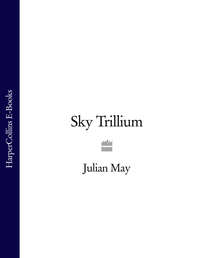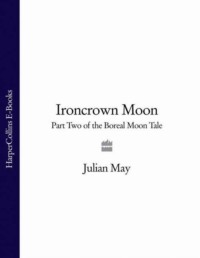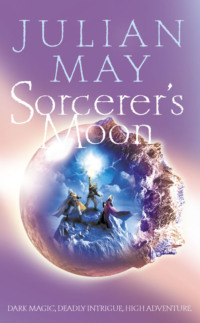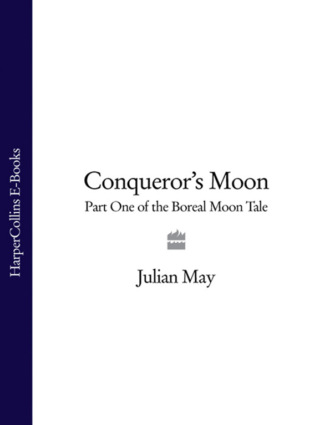
Полная версия
Conqueror’s Moon: Part One of the Boreal Moon Tale

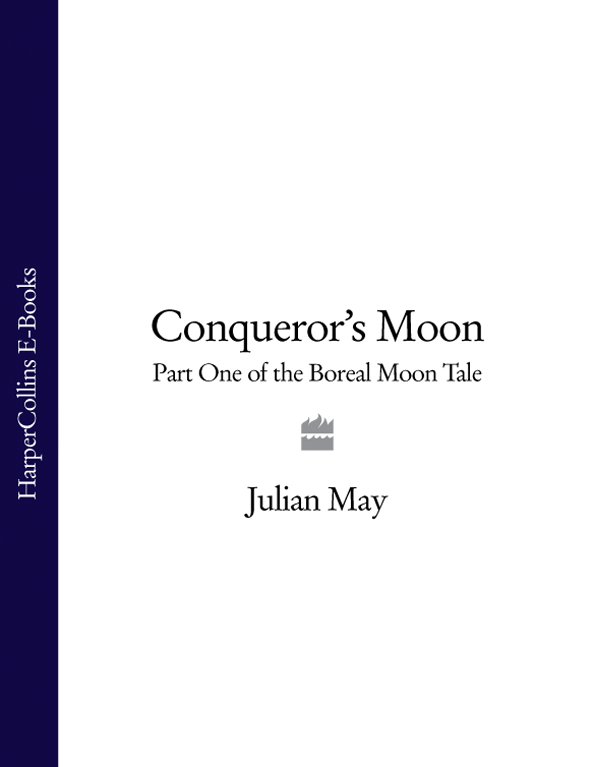
Voyager
Conqueror’s Moon
THE BOREAL MOON TALE
BOOK ONE
JULIAN MAY

Copyright
This novel is entirely a work of fiction. The names, characters and incidents portrayed in it are the work of the author’s imagination. Any resemblance to actual persons, living or dead, events or localities is entirely coincidental.
Harper Voyager An Imprint of HarperCollinsPublishers Ltd. 1 London Bridge Street London SE1 9GF
http://www.harpercollins.co.uk
This paperback edition 2004
First published in Great Britain by Voyager 2003
Copyright © 2003 by Starykon Productions, Inc
The Author asserts the moral right to be identified as the author of this work
All rights reserved under International and Pan-American Copyright Conventions. By payment of the required fees, you have been granted the non-exclusive, non-transferable right to access and read the text of this ebook on-screen. No part of this text may be reproduced, transmitted, down-loaded, decompiled, reverse engineered, or stored in or introduced into any information storage and retrieval system, in any form or by any means, whether electronic or mechanical, now known or hereinafter invented, without the express written permission of HarperCollins ebooks.
HarperCollinsPublishers has made every reasonable effort to ensure that any picture content and written content in this ebook has been included or removed in accordance with the contractual and technological constraints in operation at the time of publication
Source ISBN © 9780007123209
Ebook Edition © AUGUST 2010 ISBN: 9780007378173
Version: 2018-07-30
This book is sold subject to the condition that it shall not, by way of trade or otherwise, be lent, re-sold, hired out or otherwise circulated without the publisher’s prior consent in any form of binding or cover other than that in which it is published and without a similar condition including this condition being imposed on the subsequent purchaser.
Table of Contents
Cover
Title Page
Copyright
PROLOGUE: The Royal Intelligencer
ONE
TWO
THREE
FOUR
FIVE
SIX
SEVEN
EIGHT
NINE
TEN
ELEVEN
TWELVE
THIRTEEN
FOURTEEN
FIFTEEN
SIXTEEN
SEVENTEEN
EIGHTEEN
NINETEEN
TWENTY
TWENTY-ONE
TWENTY-TWO
TWENTY-THREE
TWENTY-FOUR
TWENTY-FIVE
TWENTY-SIX
TWENTY-SEVEN
TWENTY-EIGHT
TWENTY-NINE
THIRTY
THIRTY-ONE
THIRTY-TWO
THIRTY-THREE
THIRTY-FOUR
Conqueror’s Moon
By Julian May
THE TWELVE MOONS RHYME SUNG BY CATHRAN CHILDREN
About the Publisher
PROLOGUE The Royal Intelligencer
In obedience to a command from the throne commuting my death sentence, the Lord Chancellor of Blencathra banished me to the continent two years ago, with an adequate stipend that will continue so long as I keep my mouth shut. Left unsaid was what would happen if I did not. Cutting off my pension would doubtless be the least of it; and I fear it’s only a matter of time before my silence is ensured by more economical means.
Well, if I’m caught, so let it be. I value my life, as every man does, but there’s also a great fatigue having nothing to do with bodily weariness that tempts me to release my grip and allow all the burdens to fall away.
But not yet, I think. Not quite yet.
For prudence’s sake, every morning I perform a shortsighted windsearch encompassing a dozen leagues or so round about my dwelling. I’ve not yet found anything or anyone suspicious. The one minor sigil I managed to take away with me from the palace at Cala Blenholme remains under my bed in a locked lizardwood box. It’s called Night Preserver, one of the non-hurting sort, hardly worthy of the Lights’ notice, primed for defense against assassins dispatching me in my sleep. But a truly competent cut-throat would have little difficulty getting at me during waking hours, so of late I have had to review my situation and decide whether or not I want to retain control of it, or surrender at last.
Surrender is such a seductive option when one is very old.
My years number four score and one, and I’ll certainly die soon of something, whether it be the infirmities of age or foul play. But shall I go unregarded and unsung, in the manner that I lived most of my life … or is there a more amusing option?
The gold of my royal pension has bought me a comfortable house in southern Foraile along the River Daravara, five rooms furnished well, with a peg-legged manservant to cook and keep the place from getting too squalid. This is a pleasant land, warm throughout most of the year and kind to old scars and bone breaks, where the breezes blow soft and musk-fragrant, and folk having arcane talents such as mine are so rare as to be the stuff of peasant legends. But I never before lived a tranquil life, and perhaps my attempt to do so now lies at the root of my present mental unease. Tranquillity, to one of my stripe, is boring. No one is so pitiable as a derring-doer put out to pasture, no one so frustrated as a tired old spy without an audience to impress with his cleverness.
When I first arrived in this over-placid exile, I spent some time each day overseeing my old haunts, especially Cala Palace and its ants’ nest of scheming courtiers and retainers. Not for curiosity’s sake or with any hope of learning fresh secrets, but out of a pathetic longing for those hazards and intrigues that once caused my blood to sing even as my stomach wrung itself like a bile-soaked sponge.
The diversion was a dangerous one, for I am no longer the peerless scryer I used to be, and my own unique talent shielding me from other windwatchers is fading fast, like the other arcane abilities I inherited, all unknowing, from my strange ancestor. If Cathran magickers should catch me spying on the palace, my blood would surely be forfeit. I had to ask myself if this rather tepid species of fun was worth the risk. At length, I decided that it was not.
But the pleasures left to me are so few! I am too frail of body to ride or hunt or even explore the tame jungle surrounding my house. My traitor stomach rebels at rich food. Expensive wines and liquors only put me to sleep without gladdening my spirit. And not even the cleverest bawd from the local house of joy seems able to rekindle the sweet fire in my nethers. There’s really only one source of delight left to me now.
Mischief.
The telling of secrets.
The tearing away of masks.
Why provoke trouble in piddling small ways, when one has the potential to bring on a grand firestorm that will rock a kingdom? Why not stir my sluggish passions by reliving the old dangerous life I loved?
Sitting here on my shaded porch above the languid tropical river, with only indifferent birds and my grouchy housecarl Borve to take note of my labors, I shall write it all down. At the end, if God wills that I finish, I’ll return to the island and publish the story myself. It will be supremely gratifying to revel in the ensuing scandal. Why should I care then if my reward is the sharp blade belonging to an agent of the Cathran throne, cutting my scrawny throat?
Highborn or low, the people of High Blenholme would all know who I am at last.
I was born in Chronicle Year 1112, in the Cathran capital city that was called simply Cala in the days preceding the Sovereignty. My name is Deveron Austrey. Although rumor had it in latter days that I was the by-blow of some wizard, the truth is that my father was a harnessmaker in the palace stables, as was his father before him. This would have been my work as well, had not fate decreed otherwise. My mother was a laundress, and my memories of her are scant, for she died in childbirth when I was five, taking her unbreathing babe with her. Apparently, neither of my parents showed any evidence of arcane talent. My own didn’t evidence itself until I began crossing the threshold of manhood, and I was slow to recognize it for what it was.
My father perished of wildfire fever when I was eleven years old, so I became apprenticed to my grandsire, irascible and half-blind, but still one of the most ingenious leather-workers in the royal household. I had not a tenth of his artistic skill, but I labored dutifully at my trade, urged on by the occasional smack on the ear, one more among scores of insignificant crafters in the stables, until an alert head groom took note of an odd thing.
Horses were uncommonly docile when I fitted them out in harness. Even the most fractious destrier gentled when I took him in hand, and before long I was the one called to saddle up the huge, evil-tempered stallions trained to fight in tourneys with hooves and teeth, as well as the mettlesome coursers preferred by Prince Heritor Conrig and his high-spirited young band of Heart Companions. My gift with horses was really a species of wild talent, the first to manifest itself.
The second talent to bloom was nearly the death of me.
When Prince Conrig was an unbelted youth of nineteen, not knowing what else he was, and I was twelve, still working with leather but also filling in as an undergroom, I had occasion to lead His Grace’s skittish horse to him before a hunt. He spoke to me kindly, and after looking him in the eye. I dared to answer back with what I thought was an innocent observation.
Horrified by what I told him so casually, the prince thought at first to have me killed. (And told this freely to me later, as he swore me to secrecy with a formidable oath.) But even then I possessed a glib tongue and a winning manner, and after close questioning and deep thought Conrig realized that I could be supremely useful to him in a singular way. So he made me his fourth footman, in time dubbing me Snudge because of my artful sneakiness, and thus my later patrons also styled me.
My crabby grandsire, deprived of a useful dogsbody by my promotion to the royal household, predicted that nothing good would come of me aspiring beyond my God-given place. He died a few months later, by which time I had completely forgotten his dire prophecy. Whether it was true or not I leave to the judgment of those who read this tale of mine.
I was Royal Intelligencer throughout most of my life. I fought and fled and skulked and snooped and committed red murder and magical mayhem in the service of King Conrig Ironcrown and his three remarkable sons. I was condemned and reprieved by another of that family, who continues to rule peaceably enough in the wake of the Sovereignty’s dissolution.
I was perhaps the most humble of their arcanely talented servants, but so insidious and necessary that I witnessed — and even secretly helped to bring about — many a regal triumph and defeat. That was in times long past, four thousand leagues to the north, on an island where sorcery was once taken for granted and inhuman presences still share the world with mankind.
Continental readers unfamiliar with my former home may appreciate a brief description of it, and they would also do well to consult a map as the story unfolds. Others may skip directly to the first part of the tale, here following.
High Blenholme, an island in the Boreal Sea, is a rugged, roughly oblong landmass with a broad north-westerly extension. It is about four hundred leagues in width and measures roughly six hundred leagues from north to south. Blenholme means ‘moon island’ in the old Forailean tongue. At that northern latitude, a trick of the eye makes the heavenly orb seem much larger than normal at certain times of the year, and so the moon enjoys a prominent place in local religion and folklore.
What with the wildness of the waters surrounding the island, the reefs and frowning precipices that guard its approaches, and the Salka, Green Men, Small Lights, and Beaconfolk who haunted the place in prehistoric times, High Blenholme was shunned by Continental explorers and would-be settlers until the mighty invasion fleet of Bazekoy the Great sailed into Cala Bay, and he himself planted his standard at the mouth of the River Brent. That portentous event marked Year 1 of the Blenholme Chronicle.
The emperor’s heavily armed, disciplined forces drove the sluggish Salka monsters beyond the central mountain ranges and the Green Men into the Elderwold. The Small Lights were only a minor threat to humankind and learned the virtue of staying inconspicuous, while the mighty Beaconfolk unaccountably gave no resistance at all to the invasion. Perhaps they were in the mood for fresh amusements!
Bazekoy named the fertile southern part of the island Blencathra, ‘moon garden,’ and it soon attracted hordes of farmers, herders, and hunters from the teeming mainland. The discovery of iron ore in the west and rich copper deposits along the River LiAt led Bazekoy to establish mining and smelting operations, and even facilities for manufacturing weapons and armor to further his continental conquests. By the time of the emperor’s death in Chronicle Year 62, Blencathra was a thriving province, exporting not only metals but also grain and many other kinds of valued goods to Foraile, Stippen, and Andradh, and even to other nations more distant.
After Bazekoy’s incompetent successors allowed his empire to disintegrate, Cathra became an independent kingdom — although still attractive to continuing waves of immigrants from the politically turbulent Continent. Over the next thousand years the entire island was gradually taken over by humankind and most of the surviving Salka forced into the fens or the dreary Dawntide Isles far to the east.
Geography divides Blenholme naturally into four realms; but Cathra, south of the dividing range, has always remained the richest, most populous, and most fortunate.
The second kingdom to be established was Blendidion (‘moon forest’) in the north-central part of the island, more austere of clime and having soil mostly thin and poor. It was settled in the mid-500s by rude barbarian adventurers from Stippen, who subdued the scattered Cathran settlements, then married into them. The vigorous newcomers exploited Didion’s vast woodlands and established their fortunes through forestry products and shipbuilding. The land also possessed valuable furs and deposits of tin, which it exported to Cathra as well as to the Continent. In time, it became a prosperous, loosely knit nation of quarreling dukedoms and isolated robber-baronies owing reluctant fealty to the Didionite monarch at Holt Mallburn.
The windswept northwestern peninsula of the island was explored late in the Seventh Century by marine marauders of Andradh who called themselves Wave-Harriers. They discovered gold nuggets and valuable opals along the pebbled shore of Goodfortune Bay, settled the area, and defended it successfully against the navies of Cathra and Didion, which lacked the Harriers’ fighting prowess at sea. Later, the Andradhian incomers discovered the sources of the gold — enormous living volcanos whose effusions warmed certain rivers and created temperate valleys in what was otherwise an arctic wilderness. Sulphur deposits from the geyserlands and saltpetre exuding from rocks in the White Rime Mountains inspired an anonymous alchymist to invent tarnblaze. That eerie weapon, immune to magical defenses, ensured that the upstarts now calling themselves the Sealords of Blentarn (‘moon pool’) and their descendants would keep their bleak but wealthy homeland safe against all attackers.
The fourth island kingdom, tiny Moss in the chill northeastern marshes, was born almost by chance in Chronicle Year 1022. Originally a precarious outpost of Didionite sealhunters, fishermen, and amber-traders, the fortified castle of Fenguard came under the control of a mighty sorcerer named Rothbannon Bajor. He had acquired Seven Stones from the Salka, sigils carved from moonstone capable of high sorcery that drew their power from the Beaconfolk. This man’s demands for tribute from the locals, enforced by hideous atrocities, energized the Didionite authorities, who condemned Rothbannon to death in absentia and sent a warship to carry out the sentence.
Warned of his impending fate by friendly Salka shamans, Rothbannon invoked the dreaded Beaconfolk and used one of the Seven Stones to whistle up a gale that drove the man o’ war onto the Darkling Sands, where all but a handful of the expedition perished. The self-styled Conjure-King of Blenmoss (‘moon swamp’) then demonstrated other of his formidable powers to the awestricken survivors of the shipwreck, and afterwards sent them home to Holt Mallburn in a leaky fishing smack, carrying a list of non-negotiable demands.
The King of Didion paid substantial tribute to the terrible Conjure-King for decades; but when Rothbannon died, his successors proved much less adroit in the art of extortion, since they were afraid of the perilous Seven Stones and the Beaconfolk who empowered them. Didion stopped paying tribute, but decided that reconquering Moss was more trouble than the place was worth. After all, the Mossbacks would have to sell their sealskins and amber to someone — and the traders of Didion were always ready to do business.
The four kingdoms of High Blenholme on occasion squabbled viciously but never went to war — until 1128, when my tale begins. I was at that time sixteen years of age, and had served Prince Heritor Conrig as a fledgling snudge and secret talent for four of them. We were more than master and man, for I alone knew what it was that set the prince apart from ordinary mortals.
Or so I believed.
It was a peculiar time. For three years, in a manner unprecedented, the volcanos of Tarn had been in a state of intermittent eruption, filling the Boreal skies with a haze of dark ash that folklore named the Wolf’s Breath. The phenomenon had previously been very rare and of brief duration, albeit much dreaded in Didion, where prevailing winds carried the ash-clouds eastward, casting a pall over the land that invariably resulted in a failed harvest.
A Wolf’s Breath persisting for three years in a row was a signal calamity, and Didion was finally pushed to the brink of famine. The mighty Sealords of Tarn also faced ruin, since a great proportion of their food was imported at high prices, and they had been forced to abandon most of their gold mining operations until the poisonous exhalations of the eruptions should cease. Even fertile Cathra produced scarcely two-thirds of its usual abundant crop of grain. This was sufficient to feed its own people, but left a diminished surplus available for trade. Only sorcery-ridden Moss, being foggy and poverty-stricken most of the time anyhow, seemed to suffer not a whit from the Wolf’s Breath.
Which was suspicious on the face of it …
Many blamed Conjure-King Linndal of Moss for the misfortune, saying that he was taking vengeance on King Achardus of Didion for having refused to consider Linndal’s daughter Ullanoth as a fit bride for his second son. Others said that the Tamians themselves had triggered the dire event by grubbing too much gold from the bowels of their mountains, so that hellfire seeped up to fill the empty space and spewed forth sky-darkening smoke. The Brothers of Zeth in Cathra, being more learned in science and wishing to instill hope, maintained that the eruptions were a natural distemper of the earth and would surely cease once the subterranean integrants regained their equilibrium.
But the eruptions did not cease.
As catastrophe overwhelmed his country, Achardus of Didion squandered his assets in a desperate attempt to buy food and ward off insurrection among his starving subjects. Eventually, the market for the nation’s raw timber, furs, and tin was glutted. Prompted (as was thought then) by conniving mainland shipbrokers, Didion began building vessels of war. These found an all-too-ready market on the Continent, where the powerful nations of Stippen, Foraile, and Andradh nursed expansionist ambitions.
In Cathra, King Olmigon Wincantor had taken to his bed with the ailment that would ultimately end his life. His Privy Council, riven by factional disputes, was at first unwilling to take effective action, even when Prince Conrig, the able heir to the throne, forcefully pointed out the potential dangers in the situation. What if the Wolf’s Breath blew for a fourth year — or even a fifth? Starving refugees from Didion were already attempting to cross the passes into Cathra. If numbers of them broke through, the rapacious Continental nations, who had long coveted High Blenholme’s natural riches, would probably take advantage of the resulting chaos and launch an attack on the island.
In order to forestall this peril, Prince Heritor Conrig presented his father and the Council with an ingenious plan, which they finally accepted. That the immediate consequences proved disastrous was not the prince’s fault; he was overruled by his conservative elders in the scheme’s implementation. In the wake of the debâcle, he conceived yet another bold stratagem. But this time he determined to carry it out himself.
ONE
Conrig Wincantor, Prince Heritor of Cathra, Earl of Brent, and Lord Constable of the Realm, ate without much of an appetite, picking at the cold roast beef, eel pie, and fine white wastelbread. He had no stomach at all for the cress salad with scallions or the dessert of pears seethed in cranberry cordial. The prince’s only dining companion was his older brother Vra-Stergos, newly ordained Doctor Arcanorum in the Mystic Order of the Brothers of Zeth. No pages served them. They had come to Castle Vanguard on a secret mission and their presence was unknown to the ordinary inhabitants of the northern fortress.
Their meal had been set out in a small chamber lit only by a glazed loophole, adjacent to the castle solar where the council of war was to take place. Neither of them said much, but the prince could not help but notice how Stergos’s eyes lost their focus from time to time, and how he would sometimes hold his head motionless as though listening, even though this arras-hung cubby where they supped was as quiet as winter midnight on Raven Moor.
Finally Conrig said, ‘Gossy, is there something amiss?’
The alchymist had been sitting like a man frozen, his winecup poised halfway to his lips. Now he gave a sudden start and set the drink down with a shaky hand. ‘I don’t know.’ His voice was fretful, but then Stergos had always been a worry-wart. ‘I think I sense a presence somewhere close by, someone possessed of the talent. I said nothing earlier so as not to spoil our dinner.’
‘Perhaps Snudge is watching us, trying to read our lips.’ Conrig flashed an exasperated smile. ‘Damn his impudence! But he means no harm. I’ll admonish him and box his ears later.’
‘I wish you’d left that boy behind at Brent Lodge,’ Stergos complained. ‘It was unwise to bring him along on this crucial mission. Wild talents aren’t to be trusted! He can’t be windwatched so I never know exactly what he’s up to. Deveron’s been badly spoiled by your overindulgence, Con. He needs discipline. At sixteen, he’s quite old enough to enter the novitiate at the abbey—’


